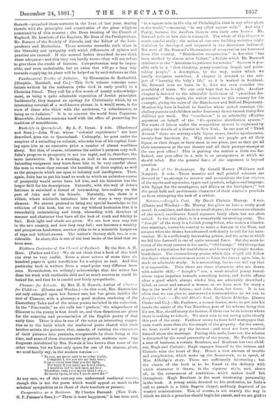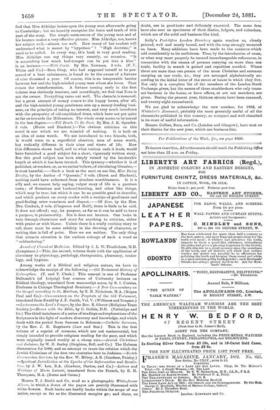find that Miss Aldridge insists upon the young man afterwards
going to Cambridge ; but we heartily recognise the force and truth of this part of the story. The simple earnestness of the young man and of his hearers makes a very effective picture. Miss Aldridge, too, knows her subject well,—almost too well. How many of her readers will
understand what is meant by " hypetism " " High doctrine," it used to be called. In every way, this book is very good reading. Miss Aldridge can say things very smartly, on occasion. "It is astonishing how much bad-temper can be put into a kiss," is an instance.—With Costs. By Mrs. Newman. 3 vols. (F. V. White and Co.)—Rosa Gray, who had supposed herself to be pos- sessed of a bare subsistence, is found to be the owner of a fortune of nine thousand a year. Of course, this is an insuperable barrier between her and the high-minded young man whom she loves. Then comes the transformation. A fortune coming early in the first volume was obviously insecure, and accordingly, we find that Nora is not the owner. Everything turns out well. The obstacle is removed, but a great amount of money comes to the happy lovers, after all, and the high-minded young gentleman sets up a money-lending busi- ness, on the principle of taking no interest, and very much interferes with the prosperity of old-established firms, which have not got quite so far on towards the Millennium. The whole story seems to be-unreal in the last degree.—Till Death Us Do Part. By Mrs. J. K. Spender. 3 vols. (Hurst and Blackett.)—The obvious criticism on this novel is one which we are wearied of making. It is built on an idea of some worth. We are introduced to two friends, both, it would seem to a superficial observer, men of some worth, but radically different in their aims and views of life. How this difference shows itself, and to what various ends it leads, would have furnished a good subject for a short, vigorously written story. But this good subject has been simply ruined by the intolerable length at which it has been treated. This tyranny—whether it is of publisher, or readers, or, as we rather believe, of circulating libraries,— is most harmful.—Such a book as the next on our list, Miss Da isy Dimity, by the Author of " Queenie," 3 vols. (Hurst and Blackett), nothing could have redeemed from absolute worthlessness. It is a silly and, we cannot help saying, vulgar story of life in a garrison town ; of flirtations and husband-hunting, and other like things, which may be true, bat which it can be no possible good to describe, and which produce on every reader with a vestige of good-taste and good-feeling utter weariness and disgust.—Of Rose, by the Hon. Mrs. Cradock, 2 vols. (Chapman and Hall), there is little to be said. It does not offend ; nay, its purpose, as far as it can be said to have a purpose, is praiseworthy. But it does not interest. One looks in vain through characters and story for anything to criticise, either with praise or with blame. Unless there is a really exciting story to tell, there must be some subtlety in the drawing of character, or writing that is full of point. Here we see neither. The only thing that attracts attention is the curious coinage of such a word as " unblundering."







































 Previous page
Previous page